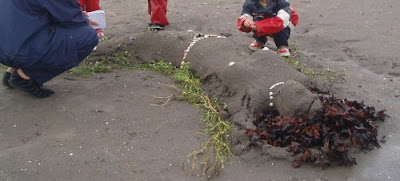 The last ten years I have been teaching at the early childhood training programs at Faculty of Education at Vestfold University College, located in Tønsberg, approx. 100 km. South from Oslo - it’s here I “belong to”, and where my colleagues are. This is also the place where the project “Children’s Language Learning, and Learning through Language”, supported by Norwegian Research Council, is situated. I am one of nine teachers who are working on projects with different approaches to language in kindergarten.
The last ten years I have been teaching at the early childhood training programs at Faculty of Education at Vestfold University College, located in Tønsberg, approx. 100 km. South from Oslo - it’s here I “belong to”, and where my colleagues are. This is also the place where the project “Children’s Language Learning, and Learning through Language”, supported by Norwegian Research Council, is situated. I am one of nine teachers who are working on projects with different approaches to language in kindergarten.Last Thursday, the 8-th of January, the “Language-project-group” had a seminar where we presented our projects and commented on each others. This was a fantastic opportunity to get high quality feed back from professors and assistant professors with unique competences with in different specialisations. There were so many interesting discussions going on in that room, linking out seven projects into each others, and producing loads of associations in my head – I was a bit afraid that it would explode. To lower “the pressure” I just have to write about my associations and thoughts and I am afraid that the seminar is going to inspire much of my writing that follows…
 My colleagues Kristin R. Tholin and Turid T. Jansen are working on a project where they are trying to identify “democratic conversations in kindergarten”. They suggest that this might be a question of balance between teachers planning and her/his capacity to improvise, as well as the balance of power between the teacher and the children. Another colleague (my supervisor) Liv Gjems, spoke about the importance of “good conversations” between preschool teacher and children. In this occasion she quoted C. Snow and R. Hasan about importance of such conversations for children’s learning. Trying to identify what characterize “the good conversations”, Liv stated that “wondering questions” where a teacher really doesn’t know the answer, are essential for children’s learning through conversation. I asked myself a wondering question: What happens in the opposite situations, when a teacher knows the answer (which unfortunately often is the way one speaks to small children)?
My colleagues Kristin R. Tholin and Turid T. Jansen are working on a project where they are trying to identify “democratic conversations in kindergarten”. They suggest that this might be a question of balance between teachers planning and her/his capacity to improvise, as well as the balance of power between the teacher and the children. Another colleague (my supervisor) Liv Gjems, spoke about the importance of “good conversations” between preschool teacher and children. In this occasion she quoted C. Snow and R. Hasan about importance of such conversations for children’s learning. Trying to identify what characterize “the good conversations”, Liv stated that “wondering questions” where a teacher really doesn’t know the answer, are essential for children’s learning through conversation. I asked myself a wondering question: What happens in the opposite situations, when a teacher knows the answer (which unfortunately often is the way one speaks to small children)?I imagined myself in the position of a child, being asked a question where I am supposed to meet the expectations about the answer which is known to the other part - How meaningful is that? Does she/he care about my answer at all? Are we having a conversation or is this just demonstration of the others predominance and power? That is probably why such “false questions” are not as motivating and do not lead to a dialogue between teachers and their kindergarten students…? What is the point of answering, when the teacher doesn’t even care? Isn’t this disrespectable, and absolutely “not-democratic”?
As a teacher in Norwegian preschool subject “forming” (which means “form-making” – and should refer to “creative work with materials” or “arts and crafts”), I see a clear parallel between such “not democratic” conversations with children”, and “form-making” activities where a child is not asked to express himself/herself, but fulfil the teacher’s expectations. When a teacher knows the answer to her question, can be compared to when she asks a child to make something, but she already had decided how the product should look like. In both cases there is no room for the child’s personal expressions because the teacher has somehow “multimodaly” communicated that such “unexpected expressions” are not required - she has already decided what she wanted to hear or view!
The presented “issue of democracy” and respect of a child’s expression is an important argument in my project. We, teachers in creative arts, have for long been trying to argument that there is a difference between product-making and creative expression! The creative expression, which is the key for aesthetic learning process (that my project is all about) can not take place if a teacher doesn’t provide possibilities for it, both by preparing room, materials, tools, time… and by supporting conversations in “democratic contexts”. There is no aesthetic learning process, if there are no democratic conversations. And there are no democratic conversations if the teacher’s focus is on products, either the medium of expression is the verbal language or the visual form!
Through this reflection, I’ve just shared with you, I understand better how strongly pedagogical contexts are influenced by the balance of power in the multimodal communication discourse in kindergarten. I see, as well, that different media of communication can not be separated from each other in a multimodal communication contexts.

Ingen kommentarer:
Legg inn en kommentar